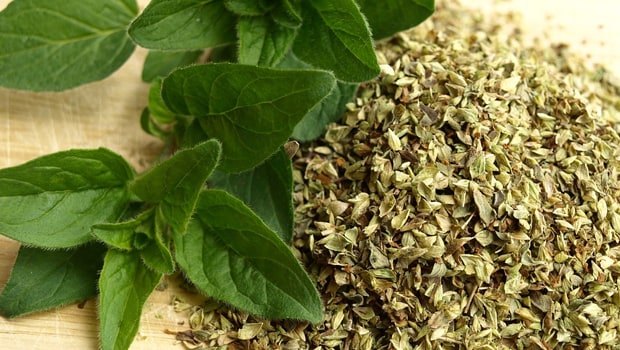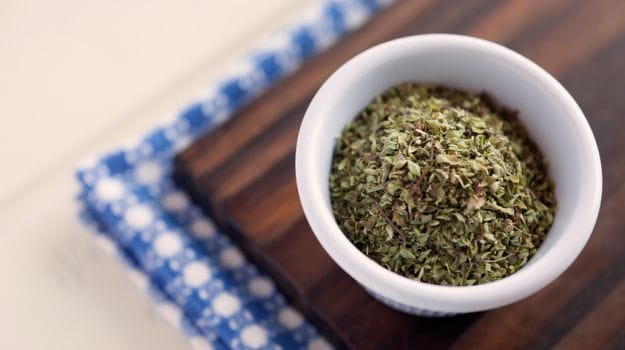You like it on your pizza, you love to mix it in your pasta; oregano is one thing you most likely reach out for whenever you order an Italian dish. Oregano has a strong flavour and brings warmth to your food, along with a hint of subtle sweetness. You can eat it fresh, dried or in the form of oil. This yummy herb adds that extra life to your food. Besides being a culinary herb used in many dishes, our beloved oregano also holds many important and effective medicinal properties. Yes, you heard that right! The impressive health benefits of oregano include its ability to strengthen the immune system and bones. It may also help in improving digestion and heart health.
Here are some health benefits of adding oregano to your daily diet:
Strengthens Immunity System
It is believed that adding fresh oregano leaves or oil to your daily diet can help boost the immune system. Various studies revealed that a gram of oregano has 42 times more antioxidant properties than apples since it is rich in vitamin A and C. According to a study published in the Journal of Nutrition, "Intake of herbs like oregano may contribute significantly to the total intake of plant antioxidants, and can be an even better source of dietary antioxidants than many other food groups such as fruits, berries, cereals and vegetables."
(Also Read: Eat Right: 8 Immunity Boosting Foods You Should Have This Monsoons)

Oregano may also help in improving digestion and heart health
Improves Digestion
Oregano is power-packed with fibre. Eating it regularly may boost our digestive system. We all know that fibre is an essential element of a healthy digestive system; it adds bulk to our stool and stimulates peristaltic motion, which moves food through the digestive tract and excretes it efficiently. According to Dr. Ritika Samaddar, who is a Delhi-based nutritionist, "Fibre is a very important part of our daily diet and we should include both types in our diet as it is very important to maintain a healthy balance. Soluble fibres are known to keep the sugar level under control, while insoluble fibres help maintain the smooth functioning of the gastric system. An average adult should take about 15 grams of fibre every day."
Improves Bone Health
As we age, our bone health also declines; therefore, it is important to load up on foods that are rich in vitamins and minerals. Oregano is rich in calcium, iron and manganese that are some of the most crucial minerals for bone health. Calcium supports the bone structure, while vitamin D works towards improving calcium absorption and growth of bones. These nutrients are not just important in your early life, but are also extremely crucial as you age. People with osteoporosis or arthritis can benefit greatly by increasing their calcium and Vitamin D intake.
(Also Read: Top 7 Calcium Rich Foods For Vegetarians and Vegans)

Oregano helps in improving the functionality of the metabolism
Helps Manage Diabetes
Oregano is also known to help manage type-1 diabetes. According to NCBI, "The extract of oregano protects from development of hyperglycaemia by reducing pro-inflammatory macrophage response. Because of the large success of the oregano extract in preventing diabetes development, it could become a fixture in future diabetes treatments." Moreover, the fibre in oregano delays digestion, which ensures that the sugar is not metabolised quickly and cause a surge in blood sugar levels.
Boosts Energy Levels
As we now know that oregano helps in improving the functionality of the metabolism, the body remains rejuvenated and energised all the time. The increase in blood circulation, thanks to the presence of minerals like iron, helps to oxygenate the cells and muscles of our body, which boosts energy and gives us strength.
Other Benefits:
Other than the benefits mentioned above, oregano is a natural painkiller that can help you do away with various body pains. According to the book, 'Healing Foods', by DK publishing, "An analgesic, oregano can ease menstrual cramps and other abdominal pain. It is also a useful diuretic and appetite stimulant and helps clear mucus, so it can be helpful in cases of colds, flu, headaches and respiratory illness."
Nutritional Facts Of Oregano
According to the United States Department of Agriculture (USDA), per 100 grams of oregano contain 4.28 gm fat, 25 mg sodium, 1260 mg potassium, 68.92 gm carbohydrates and 9 gm protein, including vitamin A (34%), calcium (159%), vitamin C (3%), iron (204%), vitamin B6 (50%) and magnesium (67%). Also, there is no cholesterol in oregano.
Now, that you know that this beneficial herb is something more than just your pizza topping, go and grab a jar of oregano and tell us about it in the comment section below.
About Shubham BhatnagarYou can often find Shubham at a small authentic Chinese or Italian restaurant sampling exotic foods and sipping a glass of wine, but he will wolf down a plate of piping hot samosas with equal gusto. However, his love for homemade food trumps all.









